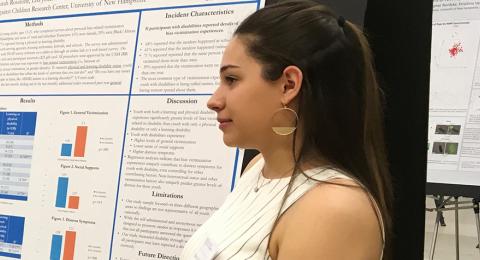What is medical sociology?
In the medical sociology cognate program, you’ll learn how biological and sociocultural factors influence behavior and behavior change, the way we think about ourselves, and our interactions with others. You’ll explore the sociological factors that affect health and how systems of social stratification help or hinder access to health resources. Although this cognate will benefit students with a range of career goals, it will be particularly useful for those seeking careers in medicine, allied health and public health for whom it will provide a demonstrable core competency.
What study medical sociology at UNH?
The social determinants and consequences of health and illness are a primary focus within the discipline of sociology and UNH faculty have considerable expertise in this field. Our faculty will prepare you to succeed in an increasingly diverse, global and technologically driven world. The program promotes scientific inquiry, digital literacy and cultural awareness. It helps you hone creative thinking and written and verbal communication skills.
Potential Careers
- Allied health professional
- Community health worker
- Doctor Hospital administrator
- Human resource representative
- Nurse Psychologist
- Senior homecare specialist
Curriculum & Requirements
The medical sociology cognate provides students with an understanding of how social structure shapes the etiology of health and illness as well as the availability, effectiveness and choices around health care on micro and macro levels. It develops students’ sociological imagination, fosters their application of a sociological perspective to the study of health, and allows them to gain the skills needed to be informed consumers of empirical health research. The focus on empirical literacy that is central to courses in sociology facilitates students’ ability to communicate and apply research findings in their respective professional fields.
Although the sociological perspective will benefit students from all backgrounds, a cognate in medical sociology may be especially relevant for students majoring in biomedical science, neuroscience and behavior, psychology, gerontology, health and physical education, nursing, health policy and administration, business, human development and others.
• Any three courses in medical/health focused sociology courses (12 credits) with a grade of C- or better
• Submission of a completed "Certification of Completion of Cognate" form
• Courses taken pass/fail may NOT be used for the cognate.
• Sociology majors may count cognate classes as major electives.
| Code | Title | Credits |
|---|---|---|
| Required Courses | ||
| Select three courses from the following: | 12 | |
SOC 555 | Death and Dying in America | |
SOC 570 | Sexual Behavior | |
SOC 620 | Drugs and Society | |
SOC 625 | Mental Health and Society | |
SOC 635W | Medical Sociology | |
SOC 647 | Sociology of Work and Well-Being | |
SOC 697 | Special Topics (Topic: Work and Well-Being) | |
SOC 740 | Sociology of Mental Health | |
SOC 788 | Advanced Medical Sociology | |
| Total Credits | 12 | |



